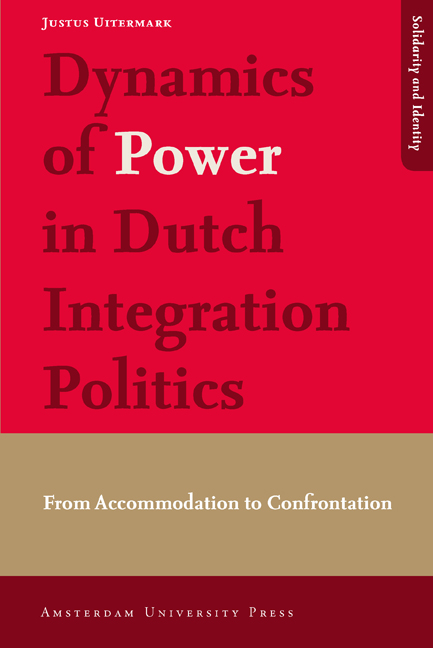3 - Introduction to Part II: Civil Power and the Integration Debate
Published online by Cambridge University Press: 15 January 2021
Summary
This chapter explains how the first part of the research question posed in Chapter 1 will be answered: how and why did power relations transform in the debate on integration? I focus specifically on the debate on the opinion pages of broadsheet newspapers. This setting formally approximates Habermas's ideal speech situation in the sense that all persons with the “competence to speak” can submit articles, express attitudes, desires and needs, and question the assertions of others (Habermas 1990: 86). What Weber considered the essence of power – the capacity of actors to carry out their will in spite of resistance from others – is absent from the opinion pages, since actors in this setting cannot use formal authority or physical force to coerce their opponents (Weber 1964: 156).
To investigate power within debates on integration – and within the civil sphere more generally – we thus have to develop and operationalize concepts that do not presuppose the exercise of physical force or formal authority but that nevertheless capture inequalities. The goal is to map power relations in the integration debate, to identify the sources of power and to explain transformations. This chapter first indicates how positions and oppositions in the debate are identified and presents the databases used in this part of the study. It then identifies different types of power and indicates how they can be examined through network methodology. The final section of the chapter explores some general developments in the debate and specifies the research questions.
Positions and oppositions in the integration debate
“Integration” was not a hot topic until 1991. But to understand developments in the debate since then, it is essential to reconstruct the evolution of the context in which the debate unfolded. The next chapter therefore provides an overview of the evolution of the Dutch civil sphere at large and reconstructs the genesis of a policy field through which minorities were to be governed. This analysis is based on the work of other researchers, archival research and my own interviews. Reliable, detailed data on debates on the opinion pages are only available after 1990; this is fortunately also the period when integration politics proliferated.
- Type
- Chapter
- Information
- Dynamics of Power in Dutch Integration PoliticsFrom Accommodation to Confrontation, pp. 47 - 60Publisher: Amsterdam University PressPrint publication year: 2013



